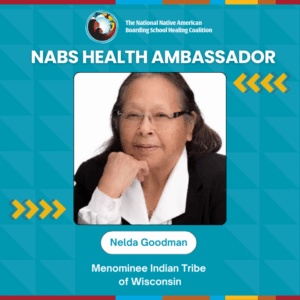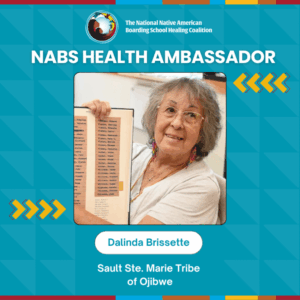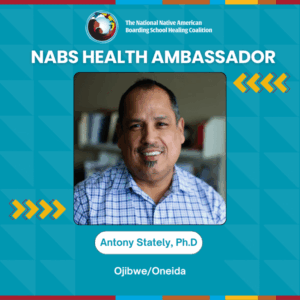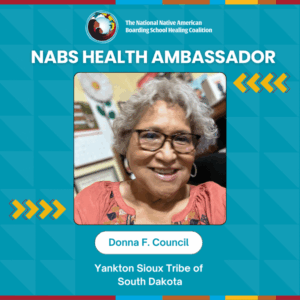We’re proud to introduce our NABS Health Ambassadors — dedicated advocates for the healing power of the arts in our communities.
In this unique role, our ambassadors will provide valuable feedback to the NABS team as we implement a powerful new project: virtual healing art forums led by Master Native artists. This initiative is designed to foster social connection, a sense of belonging, and improved mental well-being through creative expression.
From promoting culturally-based therapeutic arts to helping build partnerships with healthcare providers, these ambassadors are at the heart of a movement that blends culture, healing, and creativity.
Want to learn more about our Health Ambassadors?
Use the dropdown list below to explore each ambassador’s profile.
Nelda Goodman

Menominee Indian Tribe of Wisconsin, Forest County Potawatomi Community Honored Elder
Nelda Goodman grew up on the Menominee Reservation in Wisconsin. She has lived in Minneapolis for 51 years. Up until she received her G.E.D., she worked several odd jobs, after which she attended college at the University of Minnesota. Her work in the community involves working at a battered women’s shelter in the Twin Cities, mentoring First Nations women and girls, and working as a wellness and recovery case manager at the American Indian Family Center in St. Paul, Minnesota.
Goodman has raised 10 children, some of whom were adults before she started a career in human services focusing on the Native American community. In her work, she shares her own personal struggles with being a single parent due to domestic violence and how her challenges inspired her and others. This has led to her own successful recovery, going on 58 years.
Dora Brought Plenty

Hello, my name is Dora Brought Plenty, Oglala Lakota, Turtle Clan, registered at Standing Rock. I am a Native American artist, healer, and educator deeply grounded in my heritage. My journey in the arts spans over five decades, during which I have developed my skills in painting, sculpture, fashion design, and facilitating therapeutic art sessions. I strongly believe in the transformative power of art as a healing tool and resource for individuals and communities, particularly those underserved or impacted by trauma.
As a survivor of the Indian Boarding School system, I have transformed the adversity of my past into a source of inspiration, creating artwork that embodies resilience, endurance, and cultural identity. My therapeutic art sessions are more than just art classes; they are spaces of healing, helping others navigate through their emotions, using art as a guide. I am deeply involved in community art and use both physical and digital platforms to share my artworks and teachings. Whether it’s conducting workshops, participating in panel discussions, creating digital tutorials, or taking part in cultural events, my mission remains the same: To use art to advocate for Indigenous issues, build meaningful connections and drive positive change within our communities.
My commitment to equity and diversity is evident in all my endeavors. My work has been recognized by various media outlets such as the Dallas Morning News, KERA, and the Texas Observer, highlighting my role in promoting diverse artistic expressions and making art accessible to all. I strive to nurture inclusivity and understanding through my art, contributing to an equitable, diverse, and connected community here in Dallas.
Stay safe, stay strong, stay grounded within yourself.
Dalinda Brissette

Aanii! My name is Dalinda Brissette, but I go by Lynda. My spirit name, Wasawaanaa-kwe-bik, means “yellow light from the clouds.” I’m 74 years old and attended Holy Childhood of Jesus boarding school in Harbor Springs, Michigan, during the early 1960s. Growing up in poverty with seven siblings, four of us were sent to boarding school. There, I learned to hand sew, embroider, and darn socks—skills that sparked my lifelong passion. After leaving, my mother enrolled me in 4H, where I made my first skirt, much like the ribbon skirts I create today. With the guidance of my home economics teacher and two aunties, I fell in love with sewing. Watching my grandma and aunties adorn dance outfits with sequins for summer performances deepened my appreciation for the craft.
As a member of the bear clan, sewing is my medicine—a spiritual practice that brings me peace. Each regalia I create is a unique work of art, personalized for the wearer. Before I begin, I smudge with tobacco, a ritual suggested by my daughter, to center my heart and hands with kindness and love. My sewing has brought pride to my community, from Halloween costumes that won first place to a full regalia that earned top honors in an Ojibwe contest. Three of my pieces are displayed in a local museum, and I’ve been blessed to teach sewing classes, helping preserve our culture through beauty and tradition. This is who I am.
Antony Stately, Ph.D

Antony, (Ojibwe/Oneida) received his Ph.D. in clinical psychology from California School of Professional Psychology at Alliant International University in 1997. He currently serves as the Executive Officer and President for the Native American Community Clinic in south Minneapolis, which provides primary care, dental care, and behavioral health services to the Twin Cities Native American community. He formerly worked as the Director of Behavioral Health Programs at the Shakopee Mdewakanton Sioux Community, in Prior Lake, MN. Previously, he was a Research Scientist and Director of the Center for Translational Research at the Indigenous Wellness Research Institute, at the University of Washington-Seattle; Director of Client Services at AIDS Project Los Angeles; and the founding and inaugural Program Director for Seven Generations Child and Family Counseling Services, in Los Angeles. He has taught in clinical graduate programs at UW School of Social Work, Antioch University-Seattle, Phillips Graduate Institute, CSPP/Alliant University-Los Angeles, Antioch University-Los Angeles, and Loyola Marymount University. He has served as a consultant and advisor to the CDC, HRSA, SAMHSA, the Native American AIDS Prevention Center (NAAPC), the US-Mexico Border Health Association (PAHO/WHO), and numerous NGOs and nonprofits delivering health services to tribal and indigenous communities nationally and internationally. Antony attended St. Joseph’s Indian School in South Dakota.
Donna F. Council

I’m a proud Native American woman with a supportive husband of forty years, two adult children—one now in the spirit world—three beautiful grandchildren and one beautiful Great granddaughter, who will learn the true history of what happened to generations of our people. My core values are family and believing in myself. I know my teaching and Indian ways, understanding and go back with no shame speaking fluent Dakota /Lakota as it was stolen from my family. No more, my grandchild will know and learn all the positives in a good way. In the 1960s, my five younger sisters and I were taken and placed at St. Paul’s Marty Mission Indian Boarding School in Marty, South Dakota. Today, it’s known simply as Marty and has since been returned to the tribe. The other part of my life has been dedicated to the mental health field. I’ve worked for over thirty years in therapy, family counseling, and as a licensed school social worker, specializing in serving Native American communities and navigating the broader system. Painting and drawing have also been part of my healing process, offering quiet time to reflect and listen to the stories that emerge from what I create.
I love writing and storytelling, sharing experiences through words. My mask-making also tells its own story; each face reveals something unique. I also find joy in arranging flowers, dancing, and listening to music.